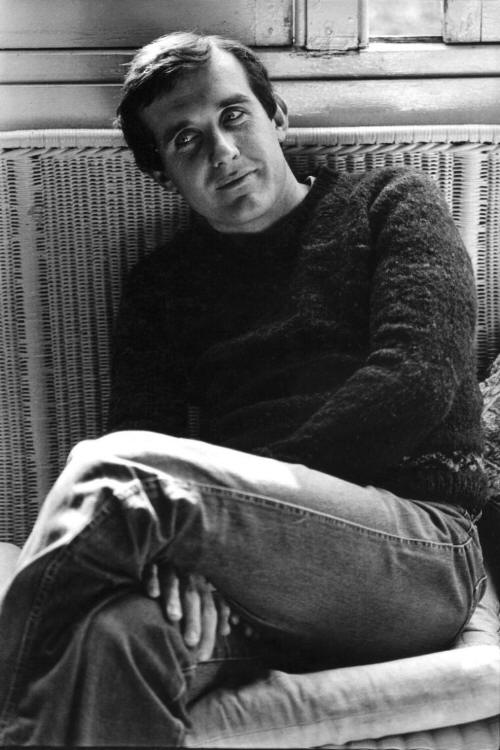

Queer Places:
New York University, 70 Washington Square S, New York, NY 10003
 Nicholas
Paul Enright AM[1]
(22 December 1950 – 30 March 2003) was an Australian dramatist and
playwright and theatre director.
Nicholas
Paul Enright AM[1]
(22 December 1950 – 30 March 2003) was an Australian dramatist and
playwright and theatre director.
Enright was born to a prosperous East Maitland professional Catholic family.[2] He was drama captain of St Ignatius' College, Riverview in 1964, where, like Gerard Windsor and Justin Fleming, he was taught by Melvyn Morrow. At that school, he won the 1sts Debating Premiership in both 1966 and 1967. It was expected that he would follow the law.
During 1971 and 1972 Enright was a member of Sydney's Genesian Theatre, performing in A Doll's House and Uncle Vanya, and directing London Assurance. Enright received a pass BA from Sydney University in 1972, having decided not to proceed to an honours degree as might have been expected of one so formidably intelligent.
He worked as a gofer for Sydney's Nimrod Theatre before being appointed a trainee director at the Melbourne Theatre Company. He won an Australia Council Fellowship to study directing at New York University, graduating in 1977. On his return to Australia, he joined the State Theatre Company of South Australia as actor and director, later becoming Associate Director. He was Head of Acting at the NIDA in 1983 and 1984.
He was encouraged to write plays while at NYU by one of his teachers, the playwright Israel Horovitz. His many plays include: Good Works,, Blackrock, Daylight Saving, Mongrels (about the relation between Australian playwrights Jim McNeil and Peter Kenna, the latter a friend), The Female Factory, A Man with Five Children, On the Wallaby, and A Poor Student,, many of them published by Currency Press. His plays – which include French and Italian translations and adaptations – have been performed by all major Australian theatre companies, including Sydney Theatre Company, Company B, the Australian Opera (as it then was), Melbourne Theatre Company, Queensland Theatre Company, State Theatre Company of South Australia, the Ensemble Theatre, Playbox, La Boite Theatre, and the Australian Theatre for Young People. His one-act theatre-in-education play A Property of the Clan was developed into the full-length play, and later film, Blackrock (1997).
He wrote the book and lyrics to a number of musical works: three musicals with Terence Clarke – The Venetian Twins; Variations (Winner, NSW Premier's Literary Play Award, 1983); and Summer Rain (commissioned for a graduating class at NIDA) -, and others with Alan John (Orlando Rourke)), David King (The Betrothed, The Voyage of Mary Bryant, The Good Fight)), and Max Lambert (Miracle City); and an opera with Graham Dudley (The Snow Queen)). He wrote the book of the original version of The Boy from Oz, from the biography of the same name written by Stephen McLean which was produced by Ben Gannon with great success around Australia, and, after his death, in New York.
His adaptation, with Justin Monjo, of Tim Winton's Cloudstreet enjoyed huge critical and box-office success at the Festivals of Sydney and Perth (whose co-production it was), on tour of Australia, at the Festival of Dublin, and in London. He wrote for ABC Radio, including Watching over Israel (1990 AWGIE winner, Best Radio Play). His non-dramatic work includes a book for children, The Maitland and Morpeth String Quartet (illustrated by Victoria Roberts), a set of verses for The Carnival of the Animals,, and occasional verse. He edited Holding the Man, a memoir by his former NIDA student, Timothy Conigrave, and, following Conigrave's death, saw it to publication by Penguin Books.
His plays deal sympathetically and insightfully with mainly lower-class Australians. Two exceptions concern his time at Riverview: St. James Infirmary Blues (he subsequently dropped 'Blues' from the title), and a teleplay for the ABC; in addition, his unproduced and unpublished play, Harper's Hill,, deals with the sort of prosperous Hunter Region people among whom he was raised, though significantly distanced by time (the play is set in the early 20th Century). He had a great ease with, and love of, words, which made him an outstanding lyricist – a talent he tended to deprecate.
Although he was openly gay, he never found his longed-for committed relationship.[3]
AAfter 15 years in remission, melanoma recurred; he died of cancer on 30 March 2003, at age 52. Three years after his death, Happy Feet was dedicated to his memory.
My published books: